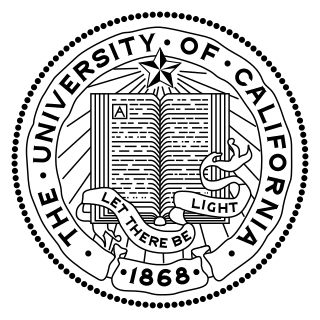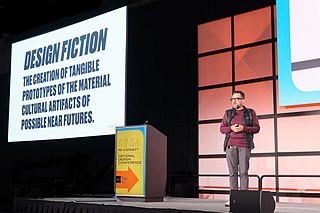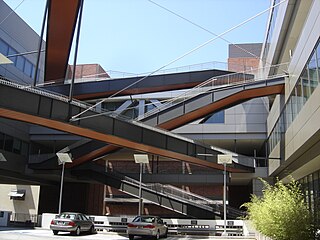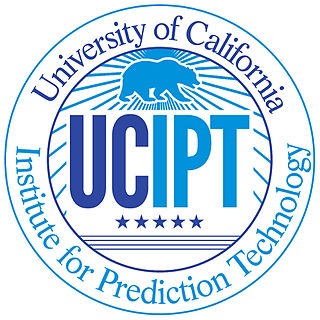
The University of California (UC) is a public land-grant research university system in the U.S. state of California. Headquartered in Oakland, the system is composed of its ten campuses at Berkeley, Davis, Irvine, Los Angeles, Merced, Riverside, San Diego, San Francisco, Santa Barbara, and Santa Cruz, along with numerous research centers and academic centers abroad. The system is the state's land-grant university.

Agilent Technologies, Inc. is an American global company headquartered in Santa Clara, California, that provides instruments, software, services, and consumables for laboratories. Agilent was established in 1999 as a spin-off from Hewlett-Packard. The resulting IPO of Agilent stock was the largest in the history of Silicon Valley at the time. From 1999 to 2014, the company produced optics, semiconductors, EDA software and test and measurement equipment for electronics; that division was spun off to form Keysight. Since then, the company has continued to expand into pharmaceutical, diagnostics & clinical, and academia & government (research) markets.
The UCLA School of Education and Information Studies is one of the academic and professional schools at the University of California, Los Angeles. Located in Los Angeles, California, the school combines two departments. Established in 1881, the school is the oldest unit at UCLA, having been founded as a normal school prior to the establishment of the university. It was incorporated into the University of California in 1919.

Rick Prelinger is an American archivist, writer, and filmmaker. A professor at the University of California, Santa Cruz, Prelinger is best known as the founder of the Prelinger Archives, a collection of 60,000 advertising, educational, industrial, and amateur films acquired by the Library of Congress in 2002 after 20 years' operation.

The University of California operates the largest academic library system in the world. It manages more than 40.8 million print volumes in 100 libraries on ten campuses. The purpose of these libraries is to assist research and instruction on the University of California campuses. While each campus library is separate, they share facilities for storage, computerized indexing, digital libraries and management.
The UC Davis School of Education is one of 10 schools and colleges at the University of California, Davis. It offers a wide range of academic and professional development programs.

Julian Bleecker is an artist and technologist with a history developing innovative mobile research projects.
The Baskin School of Engineering, known simply as Baskin Engineering, is the school of engineering at the University of California, Santa Cruz. It consists of six departments: Applied Mathematics, Biomolecular Engineering, Computational Media, Computer Science and Engineering, Electrical and Computer Engineering, and Statistics.
Eyebeam is a not-for-profit art and technology center in New York City, founded by John Seward Johnson III with co-founders David S. Johnson and Roderic R. Richardson.
The UCSC Silicon Valley Initiatives are a series of educational and research activities which together increase the presence of the University of California in Silicon Valley. To that end, UC Santa Cruz has set up a 90,000 square-foot satellite campus called the University of Santa Cruz Silicon Valley Campus (SVC), currently located on Bowers street in Santa Clara, California, where it has been since April 2016 The Initiatives, still in the early stages of their development, have had ambitious hopes attached to them by UCSC, among them the possibility of a home for the University's long-planned graduate school of management and the Bio|Info|Nano R&D Institute. It currently houses professional the SVLink incubator-accelerator program, programs and a distance education site for the UCSC Baskin School of Engineering, the UCSC Silicon Valley Extension, the Office of Industry Alliances and Technology Commercialization leadership, and the University of California's online learning program, UC Scout.

Johanna Drucker is an American author, book artist, visual theorist, and cultural critic. Her scholarly writing documents and critiques visual language: letterforms, typography, visual poetry, art, and lately, digital art aesthetics. She is currently the Martin and Bernard Breslauer Professor in the Department of Information Studies at the Graduate School of Education and Information Studies at UCLA. In 2023, she was elected to the American Philosophical Society.

Edward A. Shanken is an American art historian, whose work focuses on the entwinement of art, science and technology, with a focus on experimental new media art and visual culture. Shanken is Professor of digital arts & new media at UC Santa Cruz. His scholarship has appeared in numerous journals and anthologies and has been translated into many languages. Shanken is the author of Art and Electronic Media, among other titles.

The California Institute for Telecommunications and Information Technology (Calit2, previously Cal(IT)2), also referred to as the Qualcomm Institute (QI) at its San Diego branch, is a collaborative academic research institution of the University of California San Diego (UC San Diego), the University of California, Irvine (UCI), and University of California, Riverside. Calit2 was established in 2000 as one of the four UC Gray Davis Institutes for Science and Innovation. As a multidisciplinary research institution, it is conducting research and educational programming to leverage emerging technologies to improve the state's economy and citizens' quality of life, while addressing large-scale societal issues. Calit2 also develops and deploys prototype infrastructure for testing new solutions in real-world environments.

The California NanoSystems Institute (CNSI) is an integrated research center operating jointly at UCLA and UC Santa Barbara. Its missions are to foster interdisciplinary collaborations for discoveries in nanosystems and nanotechnology; train the next generation of scientists, educators, and technology leaders; and facilitate partnerships with industry, fueling economic development and the social well-being of California, the United States and the world.
Micha Cárdenas, stylized as micha cárdenas, is an American visual and performance artist who is an assistant professor of art and design, specializing in game studies and playable media, at the University of California Santa Cruz. Cárdenas is an artist and theorist who works with the algorithms and poetics of trans people of color in digital media.

Ramesh Srinivasan is an American academic and professor of Information Studies at the University of California, Los Angeles, with a joint appointment in Design/Media Arts.
The UCLA Smart Grid Energy Research Center (SMERC), located on the University of California Los Angeles (UCLA) campus, is an organization focused on developing the next generation of technologies and innovation for Smart Grid. SMERC partners with government agencies, technology providers, Department of Energy (DOE) research labs, universities, utilities, policymakers, electric vehicle manufacturers, and appliance manufacturers. These partnerships provide SMERC with diverse capabilities and exceptional, mature leadership.

The University of California, Institute for Prediction Technology (UCIPT) is a multidisciplinary organization seeking to accelerate technological research and innovations to predict human behavior and real-world events.

Safiya Umoja Noble is the David O. Sears Presidential Endowed Chair of Social Sciences and Professor of Gender Studies, African American Studies, and Information Studies at the University of California, Los Angeles. She is the director of the UCLA Center on Race & Digital Justice and co-director of the Minderoo Initiative on Tech & Power at the UCLA Center for Critical Internet Inquiry (C2i2). She serves as interim director of the UCLA DataX Initiative, leading work in critical data studies.

Sarah T. Roberts is a professor, author, and scholar who specializes in content moderation of social media. She is an expert in the areas of internet culture, social media, digital labor, and the intersections of media and technology. She coined the term "commercial content moderation" (CCM) to describe the job paid content moderators do to regulate legal guidelines and standards. Roberts wrote the book Behind the Screen: Content Moderation in the Shadows of Social Media.












